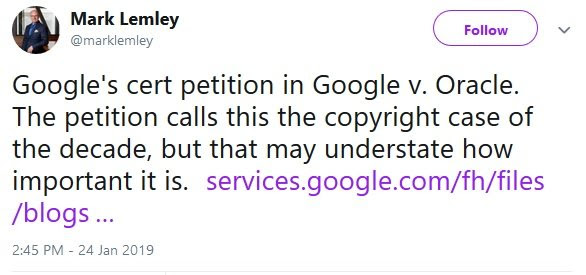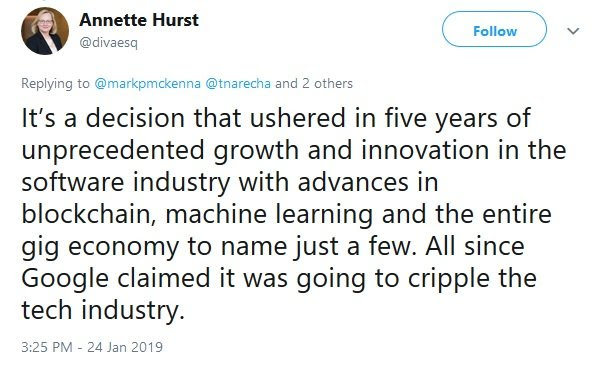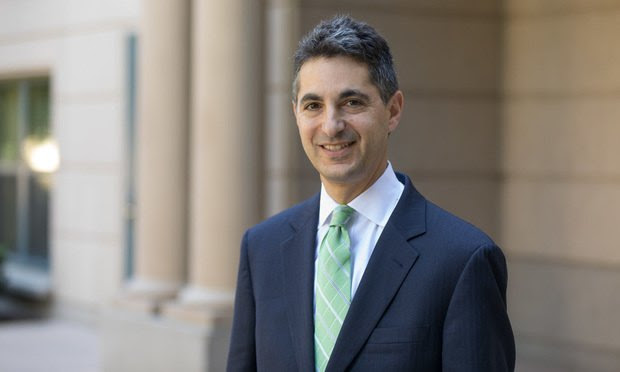Skilled in the Art: Gearing up for Oracle v. Google, the Sequel + The End is Nigh for Section 101?
Oracle has accused Google of rehashing the same copyrightability arguments that the Supreme Court has already rejected.
March 29, 2019 at 06:37 PM
8 minute read
Welcome to Skilled in the Art. I'm Law.com IP reporter Scott Graham. It's been almost nine years since Oracle sued Google for copyright infringement. By next fall, the U.S. Supreme Court will have a second chance to decide whether to weigh in. Oracle has now spelled out the reasons it thinks that shouldn't happen, and I've got a look at them below. Remember, if Oracle prevails, that means there will be a third trial, and 'round about 2023 the court ought to get one more chance for review. As always you can email me your thoughts and follow me on Twitter. 

Oracle Jabs at Google and 'Usual List of Amici'
Round 2 in Oracle and Google's titanic copyright battle over Java APIs is now fully joined at the Supreme Court. Google asked the court in January to review two Federal Circuit decisions that it said threw “a devastating one-two punch at the software industry.” The company argues that copyright protection should not extend to “software interfaces,” and that lower courts “are badly in need of guidance on how to apply the fair-use doctrine in the context of computer code.”
Oracle fired back Wednesday, accusing Google of rehashing the same copyrightability arguments the court has already rejected, and of lining up “the usual list of amici” in an effort to muddle the state of fair use law.
“Nothing has changed” since the justices followed the solicitor general's recommendation to deny cert on copyrightability four years ago, Oracle states in a brief signed by Orrick Herrington & Sutcliffe partner Josh Rosenkranz. “Nor has software development suffered the devastating impact Google predicted; the industry is doing better than ever.”.
Google argues that the Java APIs shouldn't be copyrightable because they merely provide a shorthand for accessing preexisting libraries of code. Google wrote its own implementing code, and copied only the Java declarations so that programmers could use the language to create Android applications. The Federal Circuit ruled in 2014 that the APIs—11,500 lines of code organized into 37 packages—are copyrightable. On retrial, a San Francisco jury found Google's copying a fair use, but the Federal Circuit then ruled the use was not fair as a matter of law.
Google has drawn amicus support at the Supreme Court from some 75 IP scholars and from nonprofit advocacy groups such as the Electronic Frontier Foundation, Public Knowledge, Engine Advocacy and the Computer and Communications Industry Association. Microsoft, which previously supported Oracle on copyrightability, is backing Google on fair use.
Oracle says in Wednesday's filing that there's no circuit split on fair use to resolve, and no reason to excuse Google's “egregious” copying of an entire software platform. “Neither Google nor its amici cites a single case—in any court—that has ever found it permissible to copy this much code (or this much structure and organization)” and use it for the same purpose, Rosenkranz writes.
The idea that the Federal Circuit upset the law of fair use is “vacuous, no matter how many amici Google could recruit to sign briefs attesting to their unwarranted contrary expectation,” Rosenkranz adds.
“Google's theory is that, having invested all those resources to create a program popular with platform developers and app programmers alike, Oracle should be required to let a competitor copy its code so that it can coopt the fan base to create its own best-selling sequel,” he concludes. “That argument would never fly with any other copyrighted work.”
Also signing onto Oracle's brief in opposition are Orrick partner Annette Hurst, Kirkland & Ellis partner Dale Cendali, and Oracle general counsel Dorian Daley, and associate GCs Deborah Miller and Matthew Sarboraria. Google's team includes counsel of record Kannon Shanmugam of Paul, Weiss, Rifkind, Wharton & Garrison and attorneys from Goldstein & Russell; Keker, Van Nest & Peters; King & Spalding; and Kwun Bhansali Lazarus.
Method-of-Treatment Patents Looking More Automatic
Last week I wrote about the Section 101 fight at the Supreme Court between Hikma Pharmaceuticals International and Vanda Pharmaceuticals. One of the sub-arguments is whether, if Vanda remains the law of the Federal Circuit , every method-of-treatment patent will “automatically” be patent eligible.
I'm gonna have to say that Hikma, the generic pharma trying to invalidate a patent on a schizophrenia treatment, is winning that part of the argument so far. (But see this cogent contrary argument by Maynard Cooper's Sasha Rao and Erin Gaddes.) Twice in the last two weeks the Federal Circuit has found method-of-treatment patents eligible, citing Vanda.
The latest decision came Thursday in Endo Pharmaceuticals v. Teva Pharmaceuticals USA. At issue is a method of treating pain in patients with kidney impairment. The inventors of U.S. Patent 8,808,737 found that such patients process oxymorphone more slowly than others, and therefore can be treated at lower dosages in accordance with their creatinine clearance rates.
U.S. Magistrate Judge Mary Pat Thynge and U.S. District Judge Richard Andrewshad both found the patent simply claimed a law of nature under the Supreme Court's Mayo decision. Endo's arguments otherwise were “thoroughly unconvincing,” Andrews wrote.
The Federal Circuit disagreed. “The claims at issue here are legally indistinguishable from the representative claim in Vanda,” Judge Kara Stoll wrote, in that both lay out a specific dosage regimen based on test results. “Like the claims in Vanda, the claims here 'are directed to a specific method of treatment for specific patients using a specific compound at specific doses to achieve a specific outcome,'” she wrote. Judges Raymond Clevenger and Evan Wallach concurred.
The Supreme Court last week requested the solicitor general's views on Vanda, though the office isn't expected to weigh in until the fall.
In the meantime, Sens. Thom Tillis and Chris Coons are promising to produce a “skeletal outline of legislation” to amend Section 101 at an April 17 meeting with industry and trade group representatives, according to Bloomberg Law. Tillis and Coons, the chair and ranking member of Senate Judiciary's IP subcommittee, have circulated four principles for the legislation in advance of the meeting.
As reported by Bloomberg, one principle sounds extremely broad—conferring eligibility on any invention that meets the statutory requirements of novelty, obviousness, sufficient disclosure, written description and definiteness. Another principle sounds more like a carve-out for diagnostic and life science patents—an idea Coons seemed to hint during a recent subcommittee hearing.
 U.S. District Judge Leonard Stark
U.S. District Judge Leonard StarkNo Fee Award for Bloomberg in Patent Case
Speaking of Bloomberg, the financial news provider has lost a bid for “exceptional case” attorneys fees in a patent infringement lawsuit brought by Quest Licensing.
U.S. District Judge Gregory Sleet granted summary judgment to Bloomberg, Charles Schwab and Interactive Data in 2017. He'd said Quest's claim of infringement on an apparatus for providing changing finance information “flies in the face of the court's claim construction.” The three companies moved for fees.
Sleet has since retired. U.S. District Judge Leonard Stark ruled Wednesday that, while “there are certainly grounds here on which a reasonable judge might deem this case to be exceptional,” Quest's conduct did not reach that level, my ALM colleague Tom McParland reports.
Stark found Quest's claim construction position “not unreasonable,” and noted that Sleet had said Quest made “a fine argument” at the summary judgment hearing.
“While Judge Sleet rejected plaintiff's position, this court does not feel that plaintiff should have foreseen that to be the only realistic outcome,” Stark concluded.
Quest was represented by Brown Rudnick and Bayard. Bloomberg and Charles Schwab were represented by Wilson Sonsini Goodrich & Rosati and Morris, Nichols, Arsht & Tunnell.
Another SEP-Based Injunction in England
IP licensing firm TQ Delta LLC has won an injunction from the High Court of Justice in England over a patent essential to practicing DSL technology.
An attorney with Gowling WLG, which represented TQ Delta, told World Intellectual Property Review that it was the first such judgment at the High Court since the Court of Appeal affirmed a similar ruling last fall in Unwired Planet v Huawei.
According to TQ Delta, the High Court ruled that ZyXEL Communications UK Ltd. and its Danish parent ZyXEL Communications A/S had been “holding out” from taking a license on TQ's portfolio. It enjoined ZyXEL from further infringement and ordered an interim payment of more than 1 million pounds.
Alexandra Brodie a written statement
That's all from Skilled in the Art this week. I'll see you all again on Tuesday.
This content has been archived. It is available through our partners, LexisNexis® and Bloomberg Law.
To view this content, please continue to their sites.
Not a Lexis Subscriber?
Subscribe Now
Not a Bloomberg Law Subscriber?
Subscribe Now
NOT FOR REPRINT
© 2025 ALM Global, LLC, All Rights Reserved. Request academic re-use from www.copyright.com. All other uses, submit a request to [email protected]. For more information visit Asset & Logo Licensing.
You Might Like
View All
Skilled in the Art With Scott Graham: I'm So Glad We Had This Time Together

Design Patent Appeal Splinters Federal Circuit Panel + Susman Scores $163M Jury Verdict + Finnegan Protects Under Armour's House
Trending Stories
- 1South Florida Attorney Charged With Aggravated Battery After Incident in Prime Rib Line
- 2'A Death Sentence for TikTok'?: Litigators and Experts Weigh Impact of Potential Ban on Creators and Data Privacy
- 3Bribery Case Against Former Lt. Gov. Brian Benjamin Is Dropped
- 4‘Extremely Disturbing’: AI Firms Face Class Action by ‘Taskers’ Exposed to Traumatic Content
- 5State Appeals Court Revives BraunHagey Lawsuit Alleging $4.2M Unlawful Wire to China
Who Got The Work
J. Brugh Lower of Gibbons has entered an appearance for industrial equipment supplier Devco Corporation in a pending trademark infringement lawsuit. The suit, accusing the defendant of selling knock-off Graco products, was filed Dec. 18 in New Jersey District Court by Rivkin Radler on behalf of Graco Inc. and Graco Minnesota. The case, assigned to U.S. District Judge Zahid N. Quraishi, is 3:24-cv-11294, Graco Inc. et al v. Devco Corporation.
Who Got The Work
Rebecca Maller-Stein and Kent A. Yalowitz of Arnold & Porter Kaye Scholer have entered their appearances for Hanaco Venture Capital and its executives, Lior Prosor and David Frankel, in a pending securities lawsuit. The action, filed on Dec. 24 in New York Southern District Court by Zell, Aron & Co. on behalf of Goldeneye Advisors, accuses the defendants of negligently and fraudulently managing the plaintiff's $1 million investment. The case, assigned to U.S. District Judge Vernon S. Broderick, is 1:24-cv-09918, Goldeneye Advisors, LLC v. Hanaco Venture Capital, Ltd. et al.
Who Got The Work
Attorneys from A&O Shearman has stepped in as defense counsel for Toronto-Dominion Bank and other defendants in a pending securities class action. The suit, filed Dec. 11 in New York Southern District Court by Bleichmar Fonti & Auld, accuses the defendants of concealing the bank's 'pervasive' deficiencies in regards to its compliance with the Bank Secrecy Act and the quality of its anti-money laundering controls. The case, assigned to U.S. District Judge Arun Subramanian, is 1:24-cv-09445, Gonzalez v. The Toronto-Dominion Bank et al.
Who Got The Work
Crown Castle International, a Pennsylvania company providing shared communications infrastructure, has turned to Luke D. Wolf of Gordon Rees Scully Mansukhani to fend off a pending breach-of-contract lawsuit. The court action, filed Nov. 25 in Michigan Eastern District Court by Hooper Hathaway PC on behalf of The Town Residences LLC, accuses Crown Castle of failing to transfer approximately $30,000 in utility payments from T-Mobile in breach of a roof-top lease and assignment agreement. The case, assigned to U.S. District Judge Susan K. Declercq, is 2:24-cv-13131, The Town Residences LLC v. T-Mobile US, Inc. et al.
Who Got The Work
Wilfred P. Coronato and Daniel M. Schwartz of McCarter & English have stepped in as defense counsel to Electrolux Home Products Inc. in a pending product liability lawsuit. The court action, filed Nov. 26 in New York Eastern District Court by Poulos Lopiccolo PC and Nagel Rice LLP on behalf of David Stern, alleges that the defendant's refrigerators’ drawers and shelving repeatedly break and fall apart within months after purchase. The case, assigned to U.S. District Judge Joan M. Azrack, is 2:24-cv-08204, Stern v. Electrolux Home Products, Inc.
Featured Firms
Law Offices of Gary Martin Hays & Associates, P.C.
(470) 294-1674
Law Offices of Mark E. Salomone
(857) 444-6468
Smith & Hassler
(713) 739-1250










